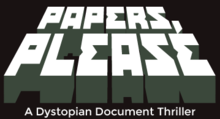Papers, Please
| Papers, Please | |
|---|---|
 | |
| Designer(s) | Lucas Pope |
| Engine | |
| Platform(s) | Microsoft Windows, OS X, Linux, PlayStation Vita |
| Release | Windows, OS X August 8, 2013 Linux February 12, 2014 |
| Genre(s) | Puzzle, simulation |
Papers, Please is a puzzle video game developed by indie game developer Lucas Pope. It focuses on the emotional toll of working as an immigration officer, deciding whom to let in and whom to exclude from entering the fictional dystopian country of Arstotzka.[1] The game was released on August 8, 2013, for Microsoft Windows and OS X,[2][3] and was released for Linux on February 12, 2014. A port for the PlayStation Vita was announced in August 2014.
Gameplay
The gameplay of Papers, Please focuses on the work life of an immigration inspector at a border checkpoint for the fictitious country of Arstotzka. The player inspects arrivals' documents and uses an array of tools to determine whether the papers are in order, for the purpose of keeping unwanted individuals, such as terrorists, wanted criminals, or smugglers, out of the country. When discrepancies are discovered, the player may interrogate the applicant about the discrepancy, and possibly demand further information, such as fingerprints or a full body scan. There are opportunities for the player to have the applicant arrested and the applicant may, at times, attempt to bribe the inspector. The player ultimately must stamp the individual's papers to accept or deny entry and then call for the next person in line; only at this point is the player told of any mistakes they may have made by way of a warning slip. Generally the player can make two mistakes without penalty, but subsequent mistakes will cost the player as a monetary demerit from their day's salaries. The player has a limited amount of real time, representing a full day shift at the checkpoint, to process as many arrivals as possible.

At the end of each in-game day, the player earns money based on how many people have been processed ($5 for each individual accepted into Arstotzka) and bribes collected, less any penalties for mistakes, and then must decide on a simple budget to spend that money on rent, food, heat, and other necessities in low-class housing for themselves and their family. As relations between Arstotzka and nearby countries deteriorate, sometimes due to terrorist attacks, new sets of rules are gradually added, based on the game's story, such as denying citizens of specific countries or demanding current documentation from citizens. The player may be challenged with moral dilemmas as the game progresses; such as allowing the supposed spouse of an immigrant through despite lacking complete papers, at the risk of accepting a terrorist into the country. The game uses a mix of randomly generated entrants and special encounters. Randomly generated entrants are created using templates.
A mysterious anti-government organization known as EZIC also appears, with several of its members appearing at the checkpoint, giving the inspector orders to help bring down the government and establish a new one; the player can choose whether to help this organization or not.
The game has a scripted story mode with twenty possible endings depending on the player's actions, as well as an unlockable, randomized endless-play mode.[2][3]
Development

Papers, Please was developed by Lucas Pope, a former developer for Naughty Dog, opting to leave the company after working on their Uncharted series to become an independent developer.[4] Work on the game began in November 2012, using the Haxe programming language and the NME framework, both open-source.[5] Originally planned as a six month project, the concept became larger than Pope initially anticipated, with the game completed in about nine months.[4]
As an American living in Japan, Pope dealt with immigration in his international travels and thought the experience, which he describes as "tense", could be made into a fun game.[1][3] Before release, Pope had set up a name submission form for the public, where people could submit their own names to be randomly assigned to scripted characters in the game. Papers, Please was submitted to Steam Greenlight on April 11, 2013, and was greenlit on May 1.[5][6]
Pope has stated intentions to port the game to the iPad, and is considering a port to the PlayStation Vita though noted that with the handheld, there are several challenges related to the game's user interface that may have to be revamped.[7] The Vita version was formally announced at the 2014 Gamescom convention in August 2014.[8]
Reception
| Aggregator | Score |
|---|---|
| GameRankings | 81.95%[9] |
| Metacritic | 85/100[10] |
| Publication | Score |
|---|---|
| Edge | 9/10[11] |
| Eurogamer | 9/10[12] |
| GameSpot | 8/10[13] |
| IGN | 8.7/10[14] |
| PC Gamer (UK) | 87/100[15] |
| Polygon | 8.0/10[16] |
| Publication | Award |
|---|---|
| BAFTA | Best Strategy & Simulation |
Papers, Please has been praised for the sense of immersion provided by the game mechanics, and the intense emotional reaction.[17] CBC News' Jonathan Ore called Papers, Please a "nerve-racking sleuthing game with relentless pacing and dozens of compelling characters – all from a desk job".[18] Simon Parkin writing for The New Yorker blog declared Papers, Please the top video game of 2013. He wrote: "Grim yet affecting, it’s a game that may change your attitude the next time you’re in line at the airport."[19]
Some critics however reacted against the paperwork gameplay. Stephanie Bendixsen from the ABC's game review show Good Game found the game "tedious", commenting "while I found the issues that arose from the decisions you are forced to make quite interesting, I was just so bored that I just struggled to go from one day to the next. I was torn between wanting to find out more, and just wanting it all to stop."[20]
Papers, Please won both the Seumas McNally Grand Prize, "Excellence in Narrative", and "Excellence in Design" awards at the 2014 Independent Games Festival Awards and nominated for the Nuovo Award.[21][22] The title also won the "Innovation Award" and "Best Downloadable Game" at the 2014 Game Developers Choice Awards.[23] The game won "Best Simulation Game" and nominated in the categories of "Best Game", "Game Design", and "Game Innovation" at the 2014 BAFTA Video Games Awards.[24][25] As of March 2014, at the time of the BAFTA awards, Pope stated that the game has sold 500,000 copies.[4]
References
- ^ a b Costantini, Cristina (May 8, 2013). "New 'Papers Please' Video Game May Surprise You". Retrieved July 23, 2013.
- ^ a b "Games created by Lucas Pope". Lucas Pope. Retrieved July 23, 2013.
- ^ a b c Gwaltney, Javy (April 14, 2013). "Glory To Arstotzka: Papers, Please And An Interview With Its Creator". Retrieved July 23, 2013.
- ^ a b c Lee, Dave (March 12, 2014). "Papers, Please: The 'boring' game that became a smash hit". BBC. Retrieved March 13, 2014.
- ^ a b "Papers, Please [Greenlight]". November 14, 2012. Retrieved July 23, 2013.
- ^ Sarkar, Samat (May 1, 2013). "Papers, Please and two other games added to Steam Greenlight". Retrieved July 23, 2014.
- ^ Cook, Dave (February 24, 2014). "Papers, Please creator wants to do PS Vita version". VG247. Retrieved February 24, 2014.
- ^ Matulef, Jeffrey (August 12, 2014). "Papers, Please is emmigrating to Vita". Retrieved August 20, 2014.
- ^ "Papers, Please for PC". GameRankings. Retrieved December 4, 2013.
- ^ "Papers, Please". Metacritic. CBS Interactive. Retrieved December 4, 2013.
- ^ "Papers, Please review". Edge (magazine). Future plc. August 21, 2013. Retrieved December 31, 2013.
- ^ Whitehead, Dan (August 9, 2013). "Papers, Please review". Eurogamer. Gamer Network. Retrieved August 9, 2013.
- ^ Peele, Britton (August 13, 2013). "Papers, Please Review". Gamespot. CBS Interactive. Retrieved August 15, 2013.
- ^ Corbett, Richard (August 12, 2013). "Papers, Please Review: Stamp of Quality". IGN. Ziff Davis. Retrieved August 15, 2013.
- ^ Lahti, Evan (August 9, 2013). "Papers, Please review". PC Gamer. Future plc. Retrieved August 9, 2013.
- ^ McElroy, Justin (August 9, 2013). "Papers, Please Review: Mundane tyranny". Polygon. Vox Media. Retrieved August 9, 2013.
- ^ Sam Machkovech. "Papers, Please Review: Paper trail of tears". Ars Technica. Condé Nast Digital. Retrieved 15 August 2013.
- ^ Ore, Jonathan (August 15, 2013). "Papers, Please is a nerve-racking game about a desk job". CBC News. CBC. Retrieved August 16, 2013.
- ^ Simon Parkin. "The Best Video Games of 2013". The New Yorker. Condé Nast Digital. Retrieved 19 December 2013.
- ^ "Papers, Please (review)". Good Game. ABC. September 17, 2013. Retrieved 31 December 2013.
- ^ "Papers, Please takes the grand prize at 16th annual IGF Awards". Gamasutra. 19 March 2014. Retrieved 19 March 2014.
- ^ "2014 Independent Games Festival announces Main Competition finalists". Gamasutra. 2014-01-07. Retrieved 2014-01-07.
- ^ "The Last Of Us wins top honors at Game Developers Choice Awards". Gamasutra. 2014-03-19. Retrieved 2014-03-19.
- ^ "BAFTA Video Game Awards - Nominations" (PDF). BAFTA. 12 February 2014. Retrieved 12 February 2014.
- ^ Lee, Dave (March 12, 2014). "Bafta games: The Last of Us clears up at awards". BBC. Retrieved March 12, 2014.
